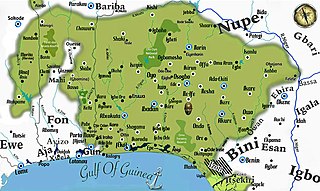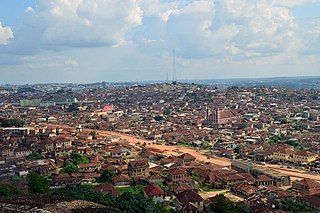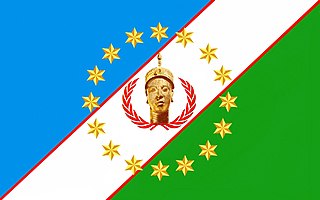Related Research Articles

Ibadan is the capital and most populous city of Oyo State, in Nigeria. It is the third-largest city by population in Nigeria after Lagos and Kano, with a total population of 2,649,000 as of 2021, and over 3 million people within its metropolitan area. It is one of the country's largest cities by geographical area. At the time of Nigeria's independence in 1960, Ibadan was the largest and most populous city in the country, and the second-most populous in Africa behind Cairo. Ibadan is ranked one of the fastest-growing cities in sub-Saharan Africa, according to the UN Human Settlements Program (2022). It is also ranked third in West Africa in the tech startups index. Ibadan joined the UNESCO Global Network of Learning Cities in 2016.

Yorubaland is the homeland and cultural region of the Yoruba people in West Africa. It spans the modern-day countries of Nigeria, Togo and Benin, and covers a total land area of 142,114 km2 (54,871 sq mi). Of this land area, 106,016 km2 (74.6%) lies within Nigeria, 18.9% in Benin, and the remaining 6.5% is in Togo. Prior to European colonization, a portion of this area was known as Yoruba country. The geo-cultural space contains an estimated 55 million people, the majority of this population being ethnic Yoruba.

Ogun State is a state in southwestern Nigeria. As a Nigerian state, Ogun is the second most industrialised state after Lagos, with a focus on metal processing. It has good road and rail connections to the harbours in Lagos and Lekki. Wole Soyinka, winner of the Nobel Prize for Literature 1986, lives in Ogun.
Ketu is the name of a Yoruba subgroup, historical kingdom and region straddling parts of what is now southeastern Republic of Benin and parts of southwest Nigeria. The chief town and traditional capital of the area was the town of Kétou (Kétu), which is considered to be one of the oldest capitals of the Yoruba-speaking people, tracing its establishment to a settlement founded by a descendant of Oduduwa called Sopasan or Soipasan. The Oba of the town were traditionally styled "Alákétu", and are related directly to Ile-Ife in present-day Nigeria. Other towns that were historically part of the Kétu Kingdom are;

Osun State, occasionally known as the State of Osun by the state government, is a state in southwestern Nigeria; bounded to the east by Ekiti and Ondo states for 84 km and for 78 km respectively, to the north by Kwara State for 73 km, to the south by Ogun State for 84 km and to the west by Oyo State, mostly across the River Osun. Named for the River Osun—a vital river which flows through the state—the state was formed from the southeast of Oyo State on 27 August 1991 and has its capital as the city of Osogbo.

Oyo State is an inland state in southwestern Nigeria. Its capital is Ibadan, the third most populous city in the country and formerly the second most populous city in Africa. Oyo State is bordered to the north by Kwara State for 337 km, to the east by Osun State for 187 km, partly across the River Osun, and to the south by Ogun State, and to the west by the Republic of Benin for 98 km. With a projected population of 7,976,100 in 2022, Oyo State is the sixth most populous in the Nigeria.

Sagamu or Ishagamu is an agglomeration of thirteen towns in southwestern Nigeria. It is located in Ogun State along the Ibu River and Eruwuru Stream between Lagos and Ibadan. It was founded in the mid 19th century by members of the Remo branch of the Yoruba people. The 13 towns are: Makun, Offin, Sonyindo, Epe, Ibido, Igbepa, Ado, Oko, Ipoji, Batoro, Ijoku, Ijagba and Latawa. It is the capital of Remo Kingdom, and the paramount ruler of the kingdom, the Akarigbo of Remo, has his palace is in the town of Offin.
The Ẹgbado, now Yewa, are a subgroup of the Yoruba people and inhabit the eastern area of Ogun West Senatorial District, Ogun State, in south-west Nigeria, Africa. In 1995 they changed their name to the Yewa which comes from the Yewa River which in turn comes from the Yoruba goddess Yewa. Yewa occupy four Local Government Areas, Yewa South, Yewa North, Imeko-Afon, and Ipokia, while the Ado-Odo/Ota LGA forms the fifth Awori part of the senatorial district.

The Awori is a subgroup of the Yoruba people speaking a dialect of the Yoruba language. The Awori people are the original inhabitants of Lagos State and some parts of Ogun State, namely Ado-Odo/Ota Local Government Area of Ogun State. The Awori people are landowners, farmers and fishermen.

Abeokuta is the capital city of Ogun State in southwest Nigeria. It is situated on the east bank of the Ogun River, near a group of rocky outcrops in a wooded savanna; 77 kilometres (48 mi) north of Lagos by railway, or 130 kilometres (81 mi) by water. As of 2006, Abeokuta and the surrounding area had a population of 449,088.

The Yoruba people are a West African ethnic group who mainly inhabit parts of Nigeria, Benin, and Togo. The areas of these countries primarily inhabited by the Yoruba are often collectively referred to as Yorubaland. The Yoruba constitute more than 48 million people in Africa, are over a million outside the continent, and bear further representation among members of the African diaspora. The vast majority of the Yoruba population is today within the country of Nigeria, where they make up 20.7% of the country's population according to Ethnologue estimations, making them one of the largest ethnic groups in Africa. Most Yoruba people speak the Yoruba language, which is the Niger-Congo language with the largest number of native or L1 speakers.
Federalism in Nigeria refers to the devolution of self-governance by the West African nation of Nigeria to its federated states, who share sovereignty with the Federal Government.
Chief Abraham Aderibigbe Adesanya was a Nigerian politician, lawyer, activist, welfarist, and liberal progressive.
Odigbo is a Local Government Area in Ondo State, Nigeria. Its headquarters are in the town of Ore.

The Ogun River is a waterway in Nigeria that discharges into the Lagos Lagoon. Ogun State of Nigeria is named after the river.

The Ekiti people are one of the largest historical subgroups of the larger Yoruba people of West Africa, located in Nigeria. They are classified as a Central Yoruba group, alongside the Ijesha, Igbomina, Yagba and Ifes. Ekiti State is populated exclusively by Ekiti people; however, it is but a segment of the historic territorial domain of Ekiti-speaking groups, which historically included towns in Ondo State such as Akure, Ilara-Mokin, Ijare, and Igbara-oke. Ogbagi, Irun, Ese, Oyin, Igasi, Afin and Eriti in the Akoko region, as well as some towns in Kwara State, are also culturally Ekiti, although belong in other states today.
The Ibarapa are a Yoruba people group located in the Southwestern corner of Oyo State. The name of the group is derived from a local cultivar of the melon plant, known locally as Egusi Ibara, which was historically acknowledged by neighboring peoples such as the Egbas, Ibadans and Oyos to be extensively cultivated in the area.
The South West is the one of the six geopolitical zones of Nigeria representing both a geographic and political region of the country's southwest. It comprises six states – Ekiti, Lagos, Ogun, Ondo, Osun, and Oyo. It makes up part of Yorubaland in Nigeria, with Kwara and parts of Kogi completing it.

The Western Nigeria Security Network (WNSN), codenamed Operation Amotekun (Yoruba for "Leopard" or "Cheetah") and simply known as the Amotekun, is a security outfit based in all the six states of the South Western, Nigeria, responsible for curbing insecurity in the region. It was founded on 9 January 2020 in Ibadan, Oyo State, Nigeria as the first regional security outfit initiated by a geopolitical zone in Nigeria.
References
- 1 2 "Western states in Nigeria and all about them". Nigerian Finder.